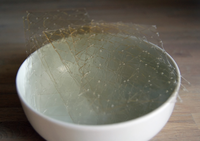
Extraction and Characterization of Proteins from Pachyrhizus ahipa Roots: an Unexploited Protein-Rich Crop
Sign Up to like & getrecommendations! Published in 2021 at "Plant Foods for Human Nutrition"
DOI: 10.1007/s11130-021-00890-y
Abstract: Pachyrhizus ahipa is an unexploited crop known to be rich in proteins compared to other edible roots and tubers. These proteins are not prolamins, thus ahipa represents an interesting new source of ingredients for gluten-free… read more here.
Keywords: crop; characterization proteins; pachyrhizus ahipa; proteins pachyrhizus ... See more keywords

Extraction, characterization and bioactive properties of Nigella sativa seedcake
Sign Up to like & getrecommendations! Published in 2017 at "Journal of Food Science and Technology"
DOI: 10.1007/s13197-017-2853-8
Abstract: The extraction of phenolic compounds from Nigella sativa seed cake was optimized in terms of % of EtOH, extraction time, extraction temperature and solid to solvent ratio to maximize the phenolic content yield. The optimized… read more here.
Keywords: extraction; bioactive properties; nigella sativa; properties nigella ... See more keywords

Extraction and characterization of alkaline protease from Streptomyces sp. GS-1 and its application as dehairing agent
Sign Up to like & getrecommendations! Published in 2020 at "Biocatalysis and agricultural biotechnology"
DOI: 10.1016/j.bcab.2020.101590
Abstract: Abstract Several microbial proteases were reported for dehairing; however, they become unstable and lose the activity at alkaline conditions during the process. Hence, there is a need for protease that withstands its activity at high… read more here.
Keywords: protease; characterization alkaline; alkaline protease; alkaline ... See more keywords

Extraction and characterization of cellulose nanofibers from Rose stems (Rosa spp.).
Sign Up to like & getrecommendations! Published in 2019 at "Carbohydrate polymers"
DOI: 10.1016/j.carbpol.2019.05.053
Abstract: The objective of the study was to explore the utilization of residual Rose stems as a source of cellulose nanofibers (CNFs). The CNFs were obtained by a so-called conventional method and another one proposed in… read more here.
Keywords: rose stems; cellulose nanofibers; nanofibers rose; extraction characterization ... See more keywords

Extraction, characterization and thermal degradation kinetics with activation energy of untreated and alkali treated Saccharum spontaneum (Kans grass) fiber
Sign Up to like & getrecommendations! Published in 2019 at "Composites Part B: Engineering"
DOI: 10.1016/j.compositesb.2019.02.042
Abstract: Abstract The research article focuses on extraction, characterization, activation energy and thermal degradation kinetics of undervalued Saccharum spontaneum (Kans grass) fibers as a possible reinforcement material in polymer composites. The fibers were extracted from Saccharum… read more here.
Keywords: activation energy; saccharum spontaneum; extraction characterization; energy ... See more keywords

Extraction and characterization of Argentine red shrimp (Pleoticus muelleri) phospholipids as raw material for liposome production.
Sign Up to like & getrecommendations! Published in 2021 at "Food chemistry"
DOI: 10.1016/j.foodchem.2021.131766
Abstract: Phospholipids rich in omega-3 fatty acids from Argentine red shrimp waste were explored as a source to produce food-grade liposomes. Partially purified phospholipids (PL-AS), hexane-soluble (HxSE) and acetone-soluble (Ac-SE) lipid co-extracts, were characterized in terms… read more here.
Keywords: extraction characterization; argentine red; shrimp pleoticus; red shrimp ... See more keywords

Extraction and characterization of chitin from sea snail Conus inscriptus (Reeve, 1843).
Sign Up to like & getrecommendations! Published in 2019 at "International journal of biological macromolecules"
DOI: 10.1016/j.ijbiomac.2018.12.241
Abstract: The chitin was extracted from C. inscriptus and the structure was elucidated. The yield of the C. inscriptus shell chitin was 21.65% on dry weight basis. The ash and moisture content of the chitin was… read more here.
Keywords: inscriptus; conus chitin; chitin; extraction characterization ... See more keywords

Extraction, characterization and biological properties of polysaccharide derived from green seaweed "Chaetomorpha linum" and its potential application in Tunisian beef sausages.
Sign Up to like & getrecommendations! Published in 2020 at "International journal of biological macromolecules"
DOI: 10.1016/j.ijbiomac.2020.01.009
Abstract: A novel polysaccharide extracted from green algae Chaetomorpha linum (PS) was characterized, using infrared spectroscopy, HPLC-FID, gel filtration high-pressure chromatography, thin layer chromatography and spectrum visible UV. Natural antioxidant potential of PS was evaluated based… read more here.
Keywords: chaetomorpha linum; biological properties; beef sausages; extraction characterization ... See more keywords

Extraction and characterization of starches from pigmented rices.
Sign Up to like & getrecommendations! Published in 2020 at "International journal of biological macromolecules"
DOI: 10.1016/j.ijbiomac.2020.04.034
Abstract: The aim of this work was to extract and characterize starch from three varieties of pigmented rice (named white, red and black), preserving the bioactive compounds. The extraction yield was 44.0%, 47.0% and 35.7%, respectively.… read more here.
Keywords: white red; characterization starches; rice; starches pigmented ... See more keywords

Extraction and characterization of novel fibers from Vernonia elaeagnifolia as a potential textile fiber
Sign Up to like & getrecommendations! Published in 2020 at "Industrial Crops and Products"
DOI: 10.1016/j.indcrop.2020.112518
Abstract: Abstract Vernonia elaeagnifolia plant is primarily used for the wall ornamentations and is abundantly available in countries like Pakistan, India, Burma, etc. The aim of this study is to investigate the use of Vernonia elaeagnifolia… read more here.
Keywords: characterization novel; vernonia elaeagnifolia; textile; fiber ... See more keywords

Extraction and characterization of humic acid from coal for the application as dispersant of ceramic powders
Sign Up to like & getrecommendations! Published in 2017 at "Journal of materials research and technology"
DOI: 10.1016/j.jmrt.2017.08.008
Abstract: Abstract Subbituminous coal was employed as raw material for the extraction of humic acid (HA) to be applied as ceramic dispersant. The extraction process is described in detail, showing it is a relatively simple procedure,… read more here.
Keywords: coal; extraction characterization; dispersant ceramic; humic acid ... See more keywords